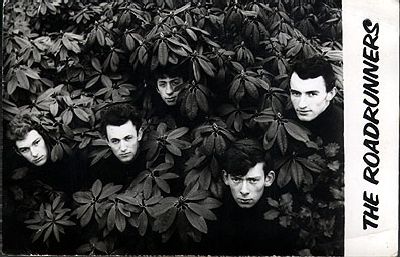- Liverpool Roadrunners
The Liverpool Roadrunners emerged from the burgeoning music scene in 1960s
Liverpool . (They were billed either as The Roadrunners or as The Road Runners. The word "Liverpool" has been added to this entry to distinguish them from other bands who subsequently used the name.)Unlike many of their contemporaries, they specialised in a Chicago/
Muddy Waters /Bo Diddley style of Rhythm and Blues - a genre of music which was more popular in the south of England at the time, led by the up-and-comingRolling Stones .Bill Harry, editor of
Mersey Beat , recollects that George Harrison once said that "The Stones are good - almost as good as the Roadrunners".The band was resident at the Hope Hall (now the Everyman Theatre). Here they entertained students from the nearby university and art school. They also took part in "happenings" organised by Liverpool poet
Adrian Henri .The band also performed at the
Cavern Club . They were invited to support the "Fab Four" - i.e.The Beatles - on their last Cavern gig on 3 August, 1963.Two trips were made to Hamburg's Star Club, and two albums were recorded. Details will be found on the web links below.

right|Dave PercyJohn PeacockMike HartDave BoycePete Mackeycirca 1960The original line-up was:
*Mike (a.k.a.'Enry) Hart - Guitar, Sax, Vocals
*Pete Mackey - Bass, Vocals
*Dave Boyce - Drums
*John Peacock - Piano
*Dave Percy - Guitar, VocalsInevitably there were changes in the line-up. The first being the addition of two sax players (Johnny Phillips and Nick la Grec) in time for the second Hamburg engagement. The band have commented that, by 1964, "everyone was jumping on the R&B bandwagon,so it was time to move on". Their second album reflects a move towards a more contemporary soul/blues sound in the manner of James Brown.
Success in Britain was elusive. Recording deals were talked about, but never seemed to happen.
The Roadrunners make two contributions to the recording of the grandly-named "First Annual R&B Festival" (1964) and also cut an e.p. to help raise money for Liverpool University's rag or "panto" week (a charity fund raising event ).
Mike Hart left the band to pursue a solo career, recording two albums for
John Peel 's "Dandelion" label. (Peel was a British radio presenter who championed the innovative rather than the commercially successful.)The band finally split in 1966.
References
*Bowen, P; A Gallery to Play To - the story of the Mersey Poets; Stride Publications; 1999; ISBN 1-900152-63-0
*Frame, P; The Beatles and Some Other Guys - Rock Family Trees of the Early 60s; Omnibus Press; 1997; ISBN 0-7119-3665-X
*Thompson, P; The Best of Cellars; Bluecoat Press; 1994; ISBN 1-872568-16-5External links
* [http://www.liverpool-roadrunners.org.uk The Liverpool Roadrunners' website]
Wikimedia Foundation. 2010.
